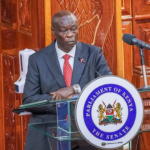Micro, Small and Medium Enterprises (MSMEs) involved in the government’s Affordable Housing programme are poised to benefit from a Ksh4.4 billion allocation for payments, as announced by President William Ruto during the Mashujaa Day celebrations in Kwale County on Sunday.
The president emphasized his administration’s commitment to the success of the Affordable Housing Programme, stating that engaging local enterprises in supplying goods and services is crucial for ensuring that all Kenyans benefit. “To facilitate this, the government has allocated Ksh.4.4 billion specifically for payments to MSMEs supplying goods and services under the program. Our collaboration with the Jua Kali sector has demonstrated the Affordable Housing Programme’s significant potential to transform local manufacturing,” Ruto stated.
He highlighted the Soweto Highrise Fabricators and Woodworkers Association in Kibera, which has secured a Ksh.720 million contract to fabricate construction materials for the project. Ruto noted that this partnership would significantly boost the business prospects of the Jua Kali association, now recognized as a legitimate supplier for the Affordable Housing Programme.
“In Kwale County, over 200 artisans are providing essential services at various sites, fabricating components such as doors, windows, and cabinet fittings. The success of involving worker cooperatives and artisans has strengthened our commitment to supporting local businesses,” Ruto added.
The president also revealed that the Affordable Housing Programme has already created over 160,000 jobs throughout the housing value chain. He acknowledged that while the industry is predominantly male, efforts are being made to increase female participation from the current 20% to 30%.
Ruto announced that in December this year, his administration will hand over 1,080 new studio units at the Mukuru Meteorological Site in Nairobi, with mortgages priced at Ksh.3,200 per month. “The revolutionary dimension of this milestone is that, finally, mortgages will no longer be the vocabulary of a lucky few but an accessible, feasible, and convenient instrument of bottom-up empowerment, making home ownership affordable and, therefore, attainable,” he further said.


